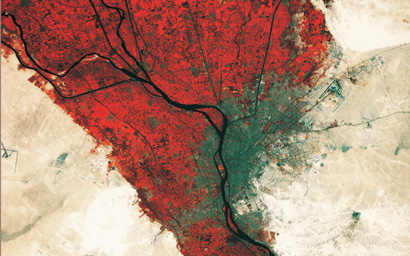 Some of the most important companies in the Middle East are global players. George Mitton profiles firms from five sectors that are expanding in the region.
Some of the most important companies in the Middle East are global players. George Mitton profiles firms from five sectors that are expanding in the region.
Huge infrastructure projects in Qatar, the expansion of regional airline fleets and the development of oil and gas stations – these are a few of the drivers of strong economic growth in the Middle East. But many of the companies involved in these projects are not indigenous.
A subsidiary of German logistics firm Deutsche Bahn is building Qatar’s railways, industrial services firm Cape is providing coatings for Bahrain’s refineries, and Boeing is making jets for the likes of Oman Air and Emirates Airline.
A look at the financial statements of these global players suggests the Middle East is an increasingly important supplier of profits and revenues. We profile five companies from five sectors to gain a better insight.
INDUSTRIAL SERVICES
Cape
Cape is listed on the London Stock Exchange, registered in Jersey and has its international headquarters in Singapore. The company provides industrial services to energy and mining companies, particularly for oil and gas plants. The company claims to be the largest provider of non-mechanical industrial services in the Gulf Cooperation Council states, having worked in the region for 30 years.
Recent wins include a $26 million (€19.7 million) contract announced in January with the Bahrain Petroleum Company to coat storage tanks and oil processing units for its refinery. Last year, Cape won a $13 million contract to supply insulation for the Jubail Export Refinery in Saudi Arabia.
The firm’s most recent financial results, for the first six months of 2011, show that nearly 40% of its adjusted operating profit came from the Middle East, though the region only accounted for about 20% of revenues. The same report shows pre-tax profits of £34 million (€40.5 million) in the first six months of 2011, down 4% on the same period in 2010.
ENERGY
Royal Dutch Shell
Royal Dutch Shell is traded on the London Stock Exchange, Euronext Amsterdam and the New York Stock Exchange. The oil and gas company is headquartered in The Hague, Netherlands, with its registered office in London. The company is active in more than 90 countries and produces more than three million barrels of oil a day.
The company recently gained government approval to form the Basrah Gas Company, a joint venture with Iraq’s South Gas Company and Mitsubishi, that will extract raw gas. Meanwhile, the firm signed a deal with Qatar Petroleum to develop a petrochemicals complex in Qatar.
According to Shell’s 2010 annual report, the company obtains 30% of its revenues from Asia, Oceania and Africa, a proportion that has gradually increased in the previous two years. The company’s 2011 earnings, adjusting to fluctuations in the oil price, were $28.6 billion, an increase of 54% on the previous year.
AVIATION
The Boeing Company
Boeing is reportedly the biggest exporter in the United States, by value of stock sold abroad. The firm receives roughly half its revenues from commercial aeroplanes and half from defence services, chiefly military aircraft, both of which are purchased in bulk by buyers in the Middle East.
International traffic for Middle East commercial carriers increased 18% in 2010, far exceeding the world average of 8% growth, according to Boeing’s world aviation outlook. There were 885 aeroplanes on order by Middle Eastern airlines as of 2011 and Boeing predicts the fleet to grow from 1,040 aeroplanes in 2010 to 2,710 in 2030.
Boeing generated net income of $4 billion in 2011, a fifth more than the previous year.
In the same period, revenues increased by 7%. The firm says its backlog grew to a record $356 billion including $103 billion of orders during the year. One of its key defence contracts of 2011 was to supply F-15 fighter jets to Saudi Arabia.
TRANSPORT
Deutsche Bahn
The scheme to build a Qatari rail network is the biggest infrastructure project in the Middle East, according to data provider Zawya, worth an estimated $43 billion. German logistics company Deutsche Bahn, through its subsidiary DB International, holds a 49% stake in the joint venture with the Qatar Investment Authority.
The project includes a metro network for the Qatari capital, Doha, with four lines and 98 stations, which will connect the airport and football stadiums for the 2022 World Cup. There will also be a long-distance network to connect Qatar with Bahrain and Saudi Arabia, with trains on the Bahrain service able to travel at 350 kilometres per hour.
Deutsche Bahn made pre-tax profits of €665 million in the first half of 2011, almost double what it made in the corresponding period of 2010. Revenues for the six months increased by nearly a fifth. Turnover at DB International was €127 million in 2010.
HOTELS
Accor
Europe’s largest hotel group, Accor, plans to double its presence in the Middle East by 2015. The company hopes to add to the 23 projects already underway, in addition to the 55 hotels it already has. The new hotels will include branches of its luxury Sofitel brand, its upscale Pullman brand, and its economy Ibis.
Accor’s revenues were just under €6 billion in 2010, up 7% compared with the previous year, while pre-tax earnings were €446 million. In its 2010 annual report, the company said 5% of its hotel portfolio was in Africa and the Middle East, and that it had just under a fifth of market share in this region.
Key target markets are Saudi Arabia, Abu Dhabi and Qatar. The company had to delay development of some hotels in Syria because of unrest in the country. Meanwhile, revenues per available room in Egypt remain low, according to Denis Hennequin, chairman and chief executive officer.
©2012 funds global
